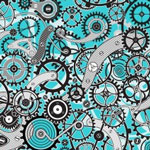Till now, I have tried to approach the complexity concept from the various point of views. Once we talked about the concept of predictability and definition of randomness. Even I tried to use the life of termites as a sample of a complex adaptive system.
In my approach to the living entities and the articles about living things and cellular organization and predictability and the living things, complexity was considered as the most important aspect of a living entity usually associated with existence of some kind of living spirit by primitive cultures.
My introduction to the concept of emergence and coining of the term inferiomorphism has some roots in my mindset based on the complexity of the systems.
So it might be a good time to bring up the complexity concept seriously and discuss it as clear as possible. I would start with the definition of a complex system and will elaborate on the technical terms in future articles.
Sure my definition, is not the most comprehensive or accurate one. But would be sufficient for a preliminary introduction. In future, we will study each of the following terms in more details.
So let me introduce a very simplified and basic definition of a complex system:
A complex system is a collection (or population) of many different entities with the specific properties and basic behaviors interacting with each other as well as the environment. When the population of the entities grows enough, there would be hard for the observer to predict the behavior of the whole system, even assuming that we know all the basic properties and behavioral rules of the entities. At this stage we have no pre-assumption about autonomy of the entities as we will see that the autonomy is a label for the complex systems beyond our full understanding.
Having the above-mentioned definition in mind, every society can be considered as a complex system made of humans.
Every human can be considered as a complex system made of organs.
Every organ can be considered as a complex system made of cells.
Every solid or liquid material can be considered as a complex system made of molecules and atoms.
In other words, with this approach, biology is nothing more than the behavioral study of a complex chemical system.
In the same way, psychology is nothing more than the behavioral study of a complex biological system.
And sociology is nothing more than the behavioral study of a complex psychological system.
The same framework can be applied to the entities with higher or lower levels of complexity. This is the reason that the complexity theory, accepting our ontological and epistemological limitations, can be considered as a theory of everything.
You can consider the complex systems somewhere in the middle of the chaotic systems and the mechanical ones. In a chaotic system, any small disturbance can lead to a major disruption and the system can not be considered as stable or even as an integrated entity. In a mechanical system, on the other hand, everything is predictable and response of the system to the external stimuli can be predicted with an acceptable precision.
Most of the words I used in the last sentences are inaccurate ones. So in the future articles we will try to define them more clearly. It may take some time, but it’s worth the effort.





